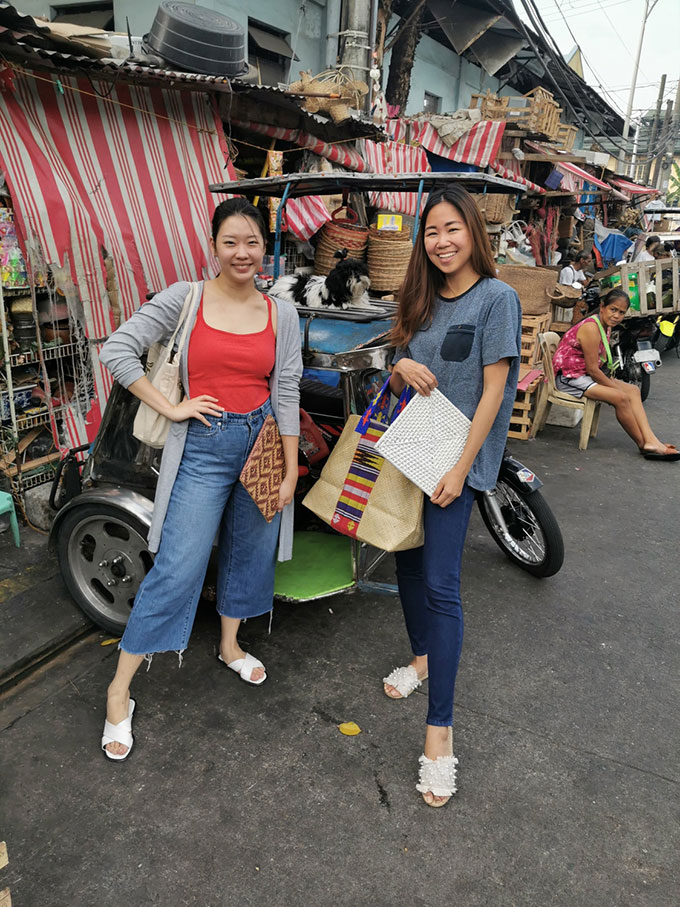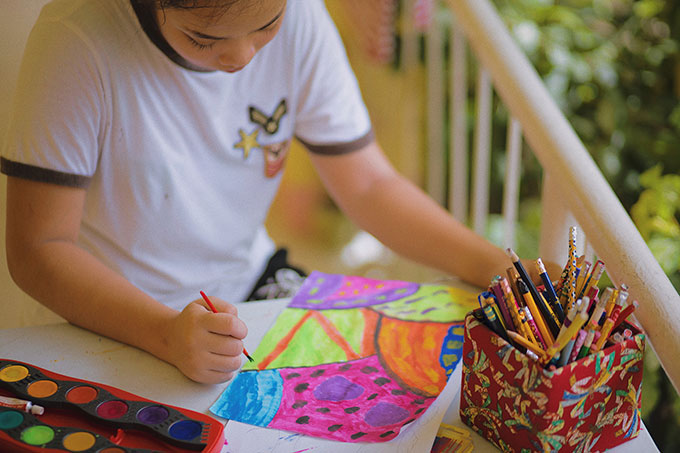This has been a five-year journey for me. In 2015, I got to a point where I wanted to see what I could do for the world as an individual, and I started Mei’s Own, a non-profit social enterprise that works with artisans in the Philippines to create home and lifestyle products. The proceeds go towards supporting education and vocational opportunities for underprivileged children and survivors of sex trafficking in the Philippines.
I credit my use of fashion as a driver for change to LaSalle College of the Arts in Singapore, which taught me about fashion as an industry. I think fashion is the most accessible industry—everyone engages with it, whether you identify as a fashion person or not. It is such a big part of pop culture, and for the next generation, fashion is a vehicle of expression and something they engage with every day.
It made sense to present Mei’s Own as a lifestyle brand so that I could reach a broader audience. I’d like people to engage with the brand because they like the products, and when we get them in the door that way, then we can start talking about our message and what we do. Fashion is a very wonderful animal because it’s ever-changing, and if we can champion a more sustainable and ethical industry, we can work together with all of the key players to change the industry. That could be a really beautiful thing.

I don’t like being labelled as a social entrepreneur—it’s conflicting because I identify as a social worker first. I am dedicating my work to these women and to these children. I’m not running some big company that is worth a lot of money or that is very glamorous. A lot of it was built on doing social work, and finding out more about these people and how I could help. It is a trial-and-error, learn-as-you-go process.
Social entrepreneurship is no different from entrepreneurship. I struggle a lot with the label because it gets put on a pedestal. We should expect all enterprises to be socially and environmentally conscious. In a modern world, not thinking about these things is backward, and if your consumers are of our generation, or younger, that’s not an exception—that should be an expectation.

It’s about thinking consciously about how your business gives back to society, or is environmentally conscious, or both. Mei’s Own gives back by channelling our profits toward education programmes and we’re very transparent with our consumers about that. It keeps us accountable for our actions.
I didn’t intend on becoming a social entrepreneur. My only intention was to find out more about the sex trafficking situation in the region. I understand that I’m very privileged—I don’t think I’ve ever taken that for granted—but I also don’t think I acknowledged that until I was a little bit older. It bothered me that I knew so little about it, and that a lot of it was happening in and around Singapore. I also felt very ashamed that I didn’t know more because I was someone who claimed to care about women and children. I felt like I wasn’t doing enough, so I started thinking about how I could make a difference. I went to Manila as a volunteer and it’s been five years since.

I didn’t realise how emotionally draining it was until I came back to Singapore because of the lockdown. In Manila, it was an everyday affair: listening to the different struggles that these women went through and receiving information that is so jarring. For example, every week I would visit the foundation and I would meet up with the social workers and we’d go through what the expenditures were. I was with my lawyers, and we talked about the bills for medication, and I was asking why one medication costs so much more than the other, and I found out that the medication was for acid reflux.

Most of the girls are 11 to 15 years old, and why they have acid reflux is because they’re recovering alcoholics. They were plied with so much alcohol that they developed acid reflux and they needed the medication to recover or to cope. There was no treatment available in that area for recovering alcoholics, especially because they are so young. They didn’t know if that would criminalise them. Finding out that that’s what they went through at such a young age, and looking at how small they are, it does get to you. I can’t break down in front of them and I didn’t know who, at the time, would understand how I felt about it. I also felt guilty, like, why am I the one feeling bad? I obviously didn’t go through this, but they’ve been through so much, and I hope that now that I’m in their lives, I can try and make a difference and make it better.
In the near future, I’d like to send more people to school. Right now, we’re working with a non-profit called Gawad Kalinga, which helps underprivileged communities. We have 300 kids in an online school and we’re working with local universities in Singapore to help mentor them. I’d like to continue building this relationship with students in Singapore because that’s how I started on my journey.

For the people that I work with—or work for, I should say—I want to continue doing more. I want to put 1,000 kids in school by the end of the year—that is a challenge I set for myself. I also want to expand Mei’s Own’s programme to other parts of the region, and also preserve artisans and their work, because it’s so beautiful. Southeast Asian arts, heritage and culture is something that we might lose, just because of how quickly we are industrialising. I hope we don’t do that because culture is about all of our stories and our struggles.

The work that these artisans do is just unbelievable. They might not be the most educated, but I think that they are the basis of our values as a culture—the inspiration for a lot of our future, and our image, as a society. That’s where it starts. So, I would like to bring this programme to other parts of Southeast Asia.
With Mei’s Own, I’m grateful for this project continuing to thrive because it’s become such a huge part of my life and my identity. Mei’s Own is a pun on the word maison in French, which means house, and it means, having something that she owns. My nickname at home is mei mei (younger sister in Mandarin), so this is as much mine, as it is for all of these women and children that I’m working with. It’s important for us to build a sense of ownership, something that no one can take away from you—and I hope that education will be that something for them.
Photographer: Wee Khim
Fashion: Desmond Lim
Hair and make-up: Greg’O using Keune and Urban Decay
Photography assistant: Alwin Oh
Fashion assistant: Joey Tan
Producer: Cindy Ow
For more stories like this, subscribe to the print edition of Vogue Singapore.





